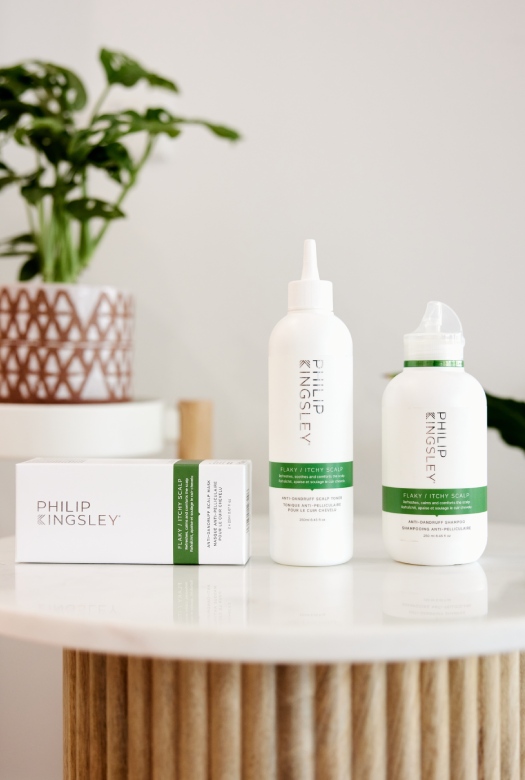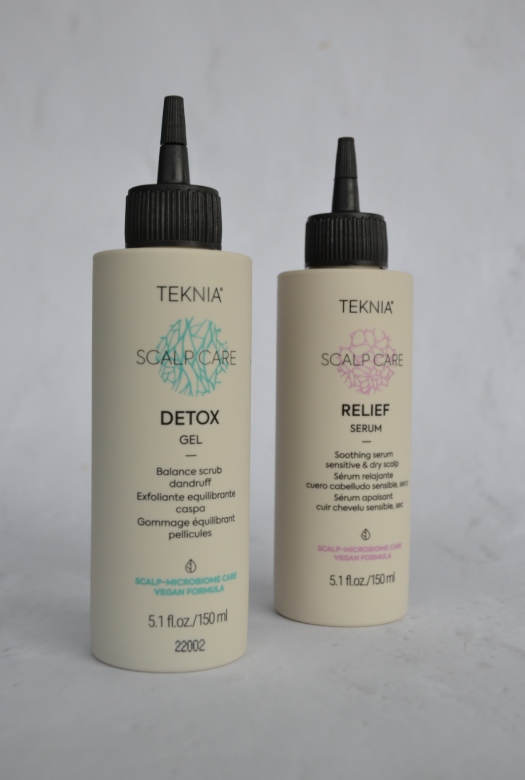
HEALTHY SCALP, HAPPY HAIR: THE IMPORTANCE OF SCALP CARE
Just like a good skincare regime, looking after your scalp as part of your hair care routine is vital to achieving healthy, strong hair. Whether it's a weekly mask, regular scalp exfoliation or daily dandruff maintenance, we’ve taken some of the guesswork out of how to care for your scalp. In this article, you’ll discover possible causes that might be triggering poor scalp health, how to treat symptoms and the best way to maintain a healthy (and happy) scalp!
COMMON SCALP CONCERNS & THEIR CAUSES
Itchy Scalp
 The main causes of an itchy scalp are dandruff and seborrheic dermatitis; these conditions occur when the microflora of the scalp becomes unbalanced. This overgrowth causes skin cells to produce more rapidly, resulting in flakes and irritation.
The main causes of an itchy scalp are dandruff and seborrheic dermatitis; these conditions occur when the microflora of the scalp becomes unbalanced. This overgrowth causes skin cells to produce more rapidly, resulting in flakes and irritation.
There are also several additional factors that can contribute to the excess production of yeast on the scalp, for instance, stress can disrupt the skin's barrier and increase its oil production, creating an environment conducive to yeast growth. Infrequent shampooing can also provide an oily habitat.
Products to use for an itchy scalp:
- Shampoos with active ingredients like salicylic acid
- Tea tree oil-based products known for their natural anti-fungal properties
- Scalp masks containing soothing ingredients like aloe vera or chamomile
Dry Scalp
A dry scalp occurs when the top layer of skin lacks moisture, commonly due to environmental factors such as weather. However, it’s more likely to develop when the scalp doesn’t produce enough sebum (oil), which often results in the appearance of fine, easily removable white flakes, accompanied by itching.
Products to use for a dry scalp:
- Moisturising shampoos and conditioners
- Scalp oils containing nourishing ingredients like jojoba oil or argan oil
- Humectant-based hair masks to lock in moisture
Oily Scalp
 The scalp, like the skin on the face, contains numerous oil glands and needs regular cleansing to prevent excessive oil accumulation, this can lead to blocked pores, pimples, flakiness, and itchiness. Regular cleansing of the scalp and avoiding any type of application of conditioner on the roots is recommended. Hormonal changes can also influence scalp oiliness, with levels of male hormones increasing during certain periods like menstruation. Stress can also contribute to an oily scalp by elevating androgen (male hormone) levels, leading to increased oil production. Hair texture is another factor, as individuals with fine hair tend to have more oil glands on their scalp, making them prone to quicker oil buildup.
The scalp, like the skin on the face, contains numerous oil glands and needs regular cleansing to prevent excessive oil accumulation, this can lead to blocked pores, pimples, flakiness, and itchiness. Regular cleansing of the scalp and avoiding any type of application of conditioner on the roots is recommended. Hormonal changes can also influence scalp oiliness, with levels of male hormones increasing during certain periods like menstruation. Stress can also contribute to an oily scalp by elevating androgen (male hormone) levels, leading to increased oil production. Hair texture is another factor, as individuals with fine hair tend to have more oil glands on their scalp, making them prone to quicker oil buildup.
Products to use for an oily scalp:
- Clarifying shampoos to remove excess oil and buildup
- Lightweight, oil-free conditioners applied away from the roots
- Scalp scrubs with gentle exfoliants
Scalp Treatments
Regular scalp treatments (potentially weekly masks and monthly exfoliation) can help remove flakes, reduce itching, and improve and maintain overall scalp health. Look for scalp treatments with active ingredients such as anti-inflammatories like salicylic acid, antioxidants, and soothing moisturisers.
Best scalp treatment products:
- Exfoliating scalp masks with glycolic acid
- Leave-in treatments with vitamin E and other antioxidants
- Overnight serums containing peptides and hyaluronic acid for deep hydration
KEY Takeaways:
- Regular cleansing helps prevent excessive oil buildup and maintains scalp health.
- Tailored products formulated for your specific scalp type to effectively manage concerns.
- Addressing stress can contribute to a healthier scalp.
- Keeping the scalp moisturised and hydrated is essential for preventing dryness and flakiness.
- Look for products containing active ingredients like salicylic acid and antioxidants for targeted scalp care.
- Incorporating routine scalp treatments into your hair care routine can provide long-term benefits for scalp health.
By incorporating these products and recommendations into your scalp care routine, you can help your clients achieve healthy (and happy) hair. Shop our wide range of Scalp Treatments at Haircare Group now.











